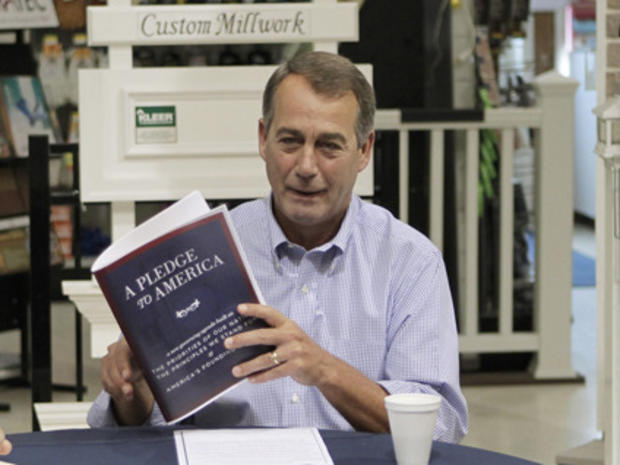Will the "Pledge to America" Help the GOP Win Over Independents?
This post originally appeared on Slate.
Republican leaders unveiling their agenda in a lumber warehouse were like their surroundings: white and wooden. In a series of stiff speeches, the House members attacked Obama's programs and promised to shrink the government by cutting spending and taxes. Unlike the unveiling of the Contract with America in 1994, when some 180 raucous GOP candidates gathered on the steps of the Capitol, the press conference just outside Washington was a low-key affair. Twelve party officials stood in a semi-circle between stacks of maple, birch, and gypsum. They spoke on behalf of the people but to an audience made up almost entirely of reporters.
The visuals fit the message: modest, sober, and focused on the economy. The Republicans admitted that while they strove to limit spending, they were not offering anything as bold as a plan to balance the budget. They weren't promising "Morning in America," but merely steps that would get the country "back on track."
"Pledge to America": The New Republican Agenda
Read the Text of the "Pledge to America"
GOP's "Pledge" Gets Mixed Reviews from Conservatives
Are Social Conservatives Losing Their Voice in the GOP?
Democrats Slam GOP for "Pledge to America," Small Biz Bill Vote
The biggest goal of the plan is political: to send a message that lawmakers are not ignoring voters. It contained garden-variety Republican talking points, but leaders pitched it as the outcome of a 20-month process of "listening" to voters. That was its most important political message in a year where each party has accused the other of not listening to voters. "We get it. We get it," said Minority Leader John Boehner, whose Republican counterpart in the Senate, Mitch McConnell, was sending the identical message.
The other important message was economic. GOP strategists have for months been arguing that Republicans need to present independent, center-right voters a set of ideas related to jobs. Under the "Pledge," small businesses will be allowed to deduct 20 percent of their annual income. The Bush tax cuts will be allowed to continue for all income brackets, which Republicans say will remove uncertainty that is crippling business. All regulations that affect more than $100 million or more in economic activity will require congressional approval.
Republicans bet that the constituency at issue here (center-right leaning independents) will be on their side in a debate about whether these policies can spur economic activity. A recent Pew poll shows they are already leaning heavily toward the GOP.
Critical Contests: Interactive Map with CBS News' Election 2010 Race Ratings
Democrats saw their own advantage in the plan. They argue the tax cuts will explode the deficit. Undoing the Obama health care plan will increase the number of uninsured and changing the rules for regulations will put lobbyists back in charge (because they can influence members of Congress voting on regulation). Democrats have been asking voters to look at the election as a choice between two visions for governing and not a referendum on Obama. Now there are specific policies that can be compared. "Now it's all on paper," said a White House aide. "They have to answer for it."
The pledge looks like a corporate report for a Midwestern conglomerate. Pictures of tree-lined streets, the Statue of Liberty, and a cowboy with a lasso are interspersed between policy promises that also cover national defense and health care reform. Big issues like education and energy policy--ones you've probably heard about--are barely addressed or go unmentioned.
While the leaders promised to restore "fiscal sanity," the $100 billion in annual cuts they propose are unspecific and tackle only a small portion of the $1.4 trillion deficit. There is no balanced-budget amendment, which disappointed some conservatives. Plus, the document says very little about how they would reform or curb entitlements to start addressing deficit growth in the future. A longtime budget policy hawk who works with Republicans labeled the plan "underwhelming." Republicans believe entitlement reform is where the big savings can be found, but to get specific is to open candidates up to attack. Boehner said he wanted to have an "adult conversation" about entitlements but not until after the election. The actual adult thing to do would be for both sides to offer their plans before the election and let the voters decide.
GOP leaders also included a host of congressional reforms in the pledge. All future bills will be posted online three days before a vote, and all legislation must cite the constitutional authority behind it. The latter provision was lauded by Tea Party groups. The pledge's repeated references to the Constitution also seemed aimed at that group.
What undermined the calls for transparency and an end to the charades in Congress were the charades the Republican leaders engaged in during the presentation. For example, they called on House Speaker Nancy Pelosi to enact this agenda now before Congress goes home in early October. They know this is impossible. It's rhetorical and unserious, but it's also dangerous. It suggests these kinds of reforms can be enacted overnight. As Boehner knows better than anyone, legislating takes time, particularly if you want lawmakers to actually read the bill. Making it seem like changes can happen with a snap may help undermine Nancy Pelosi with his voters now, but if John Boehner takes over her job, he'll face expectations he'll never be able to meet.
More from Slate:
Why the Fox News Auit against Robin Carnahan's Campaign is Bogus
Socialism, Masturbation, and Christine O'Donnell
Did JFK Really Win Because he Looked Better on TV?
John Dickerson is a CBS News political analyst. He is also Slate's chief political correspondent and author of On Her Trail. You can also follow him on Twitter here.

